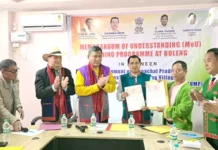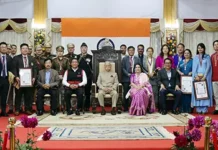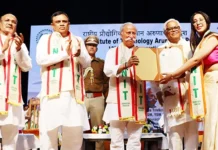NEW DELHI, 3 Jul: After its three-member delegation visited Manipur, the women’s wing of the CPI on Monday alleged that the ongoing disturbance in the northeastern state is not communal but “state-sponsored” as the government has been acting as an “onlooker” and has not done enough to quell violence.
At a press conference in the national capital, National Federation of Indian Women (NFIW) general secretary Annie Raja said that the BJP governments in the state and at the Centre should take responsibility for the situation.
Its activists urged the government to initiate dialogue and restore peace in the state. They demanded that the government disarm all groups and individuals, initiate confidence-building measures, register FIRs at the earliest, and urgently improve conditions in the relief camps.
According to the NFIW, its team was in Manipur from 28 June to 1 July.
They visited three relief camps and a government hospital in Imphal East, two camps in Moirang in Bishnupur, the district collector’s office there, and the IMA market, where they interacted with meira paibis (women-led vigilante groups).
The team also visited the district collector of Churachandpur and the assistant collector of Bishnupur, the Manipur Baptist Convention Centre Church, and the Catholic Bishop House in Imphal West.
“What is happening in Manipur is not communal violence; nor is it merely a fight between two communities. It involves the question of land, resources, and the presence of fanatics and militants,” said Raja.
“It is state-sponsored violence. We are saying this because we observed the police. They remain onlookers. Clashes are taking place in front of their eyes, and they remain spectators. It has angered both Meitei and Kuki people. The double-engine of the BJP government in the state and the Centre should take responsibility,” she said.
The members of the delegation said that mistrust between the members of Meitei and Kuki communities is deep, and “militants, fanatics and miscreants have taken advantage of the situation.”
Delegation member and advocate Deeksha Dwivedi said that, in all the relief camps, they did not find anyone who had been paid any compensation, and that the camps are lacking in facilities.
She said also that “both communities are in pain, and the government should find a way to resolve the conflict.”
Delegation member Nisha Sidhu pointed out that most camps are being run by citizens and civil society groups, with limited support from the government, and that most of those in the camps are mostly daily wage workers and ordinary people.
“The camps have persons aged one month to 80 years. Many pregnant women are also there. Food provided by the government is insufficient, especially for infants, elderly, pregnant and lactating women,” said Sidhu.
The activists also demanded setting up of a buffer zone between areas dominated by the two communities, and said that the same force should be deployed on both sides. (PTI)



